Igor Stravinsky’s first opera The Nightingale, to his own libretto in collaboration with Stepan Mitusov and based on a Hans Christian Andersen fairy-tale, premiered at the Opéra in Paris on 26 May 1914. The marvellously colourful production was commissioned by Serge Diaghilev and the Ballet Russes, and it featured designs by Alexandre Benois with Pierre Monteux conducting.
Igor Stravinsky: Le Rossignol, Scene 2 “Song of the Nightingale” (Sarah Aristidou, soprano; Orchestra of Change; Thomas Guggeis, cond.)
The Background
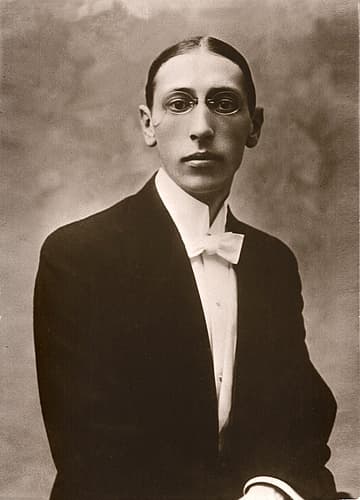
Igor Stravinsky, 1910
As Igor Stravinsky wrote in his autobiography, “This work was greatly encouraged by my master Rimsky-Korsakov, and to this day I recall with pleasure his approval of the preliminary sketches… It grieves me that he was never able to hear them in their finished form, for I think he would have liked them.” Rimsky-Korsakov’s death was the first of countless interruptions that would delay the completion of The Nightingale.
In both music and dramaturgy, The Nightingale continues the strand of a late series of fantasy operas begun by Rimsky-Korsakov. He scored his greatest hit with The Golden Cockerel, an opera about a magical bird as well. The scenario was put together in 1908, and just like the Astrologer in The Golden Cockerel, the Fisherman in The Nightingale becomes a framing character, appearing at the ends of each scene.
Igor Stravinsky: Le Rossignol – Act I: Introduction (Paris National Opera Orchestra; James Conlon, cond.)
Igor Stravinsky: Le Rossignol – Act I: Porte au vent, tombant au loin (Vsevolod, Grivnov, tenor; Natalie Dessay, soprano; Paris National Opera Orchestra; James Conlon, cond.)
The Plot
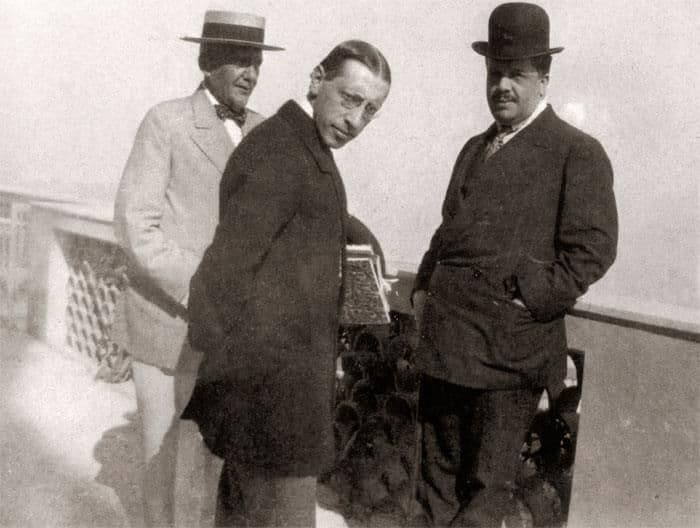
Stravinsky and Diaghilev
Set in ancient times at the Court of the Emperor of China, a fisherman listens to the song of a Nightingale. The beauty of its singing is renowned throughout the lands, and it greatly intrigues the Emperor. He sends out the Court Chamberlain to issue an invitation for the bird to officially sing for the Emperor. The Nightingale accepts the invitation but explains that its sweetest song can only be heard in the forest.
The palace is festively adorned for the arrival of the Nightingale, and everybody is informed that it is a small and virtually invisible bird but that its song causes the listeners to cry. The Emperor commands the Nightingale to sing, and he is deeply touched and rewards the bird with a golden slipper. Three Japanese emissaries offer the Emperor a mechanical nightingale, which begins to sing. The Emperor is delighted, but the real Nightingale is insulted and flies away. The angered emperor orders it banished from his realm.
With the Emperor ill and near death, the figure of Death appears in his chamber. The ghosts of the Emperor’s past deeds visit him while he calls for his court musicians. The mechanical bird refused to sing, but the genuine Nightingale reappeared and started to sing. Death is greatly moved and agrees to return the Emperor to life. The Emperor falls into a deep slumber and wakes up fresh and restored. The Nightingale becomes the “first singer” at court and promises to sing for the Emperor each night from dusk until dawn.
Igor Stravinsky: Le Rossignol – Act I: Voici l’endroit, pres de ces arbres (Marie McLaughlin, soprano; Natalie Dessay, soprano; Vsevolod Grivnov, tenor; Laurent Naouri, baritone; Maxim Mikhailov, bass; Paris National Opera Chorus; Paris National Opera Orchestra; James Conlon, cond.)
Igor Stravinsky: Le Rossignol – Act I: Beau rossignol, incomparable oiseau (Laurent Naouri, baritone; Maxim Mikhailov, bass; Marie McLaughlin, soprano; Natalie Dessay, soprano; Vsevolod Grivnov, tenor; Paris National Opera Chorus; Paris National Opera Orchestra; James Conlon, cond.)
The Delay
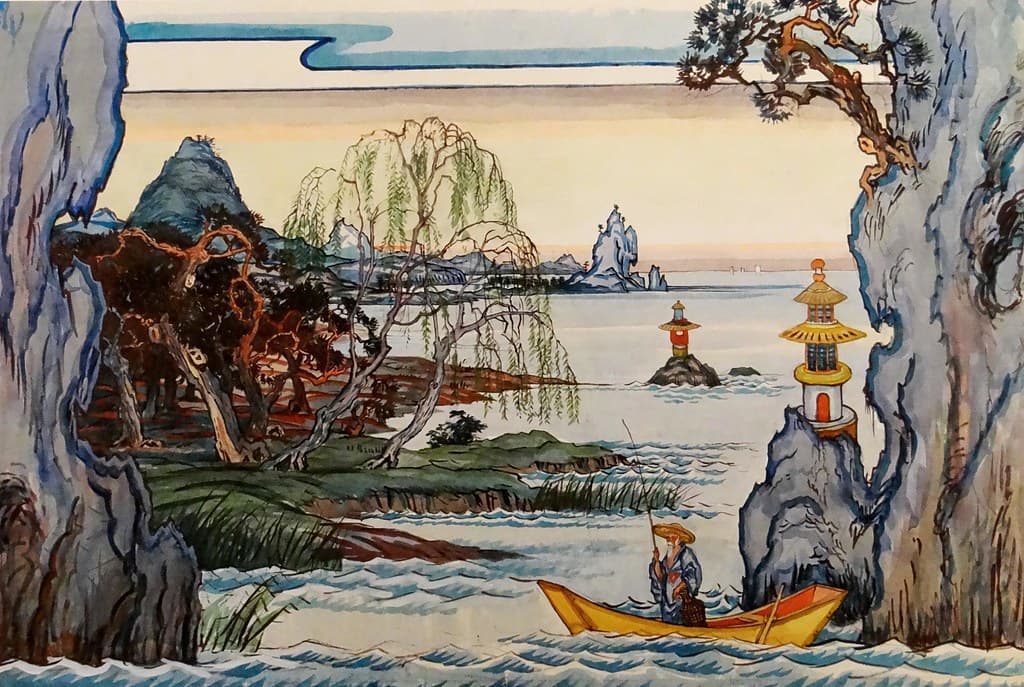
Design for Act I, by Alexandre Benois
Before Stravinsky had a chance to return to the opera, Serge Diaghilev asked him to orchestrate two Chopin pieces for the ballet Les Sylphides. This was followed by the commission of the ballet score to the Firebird, and then came Petrushka, and The Rite of Spring in 1912. By now, Stravinsky’s musical style was radically different from when he first started, and he writes, “I feared that in view of my new manner, the subsequent scenes would clash with Act 1.”
Stravinsky suggested turning Act 1 into an independent lyrical scene for a concert performance. He imagined a self-contained tone poem with voices, but the directors of the Free Theatre in Moscow would have none of it. They insisted upon the entire opera in three acts for the theatre’s first season. “My greatest dream,” wrote the director, “is to show you off to Moscow, to St Peterburg, indeed to all of Russia.”
Igor Stravinsky: Le Rossignol – Act II: Chanson du rossignol: Ah, joie, empllis mon coeur (Natalie Dessay, soprano; Albert Schagidullin, baritone; Laurent Naouri, baritone; Paris National Opera Orchestra; James Conlon, cond.)
Igor Stravinsky: Le Rossignol – Act II: Ah coucher du soleil (Paris National Opera Chorus; Paris National Opera Orchestra; James Conlon, cond.)
Towards the Premiere
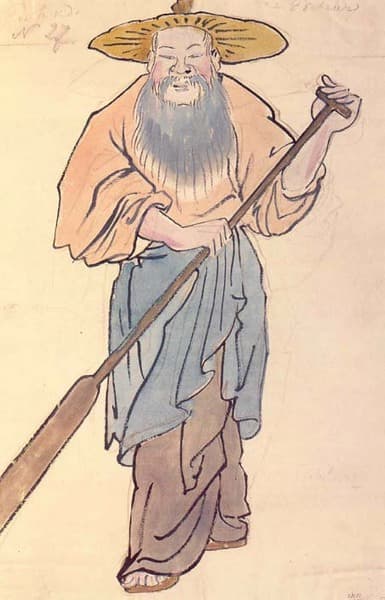
The Fisherman, designed by Alexandre Benois
With his three early ballets, Stravinsky had become famous in Western Europe, but he was still basically unknown in his homeland. Stravinsky was delighted and, after some hesitation, decided to complete The Nightingale in return for a very high fee. He also demanded that the 45-minute work in three tiny acts could be substituted for the whole evening’s entertainment originally requested.
With the agreements in place, Stravinsky “managed to rationalize the resulting stylistic incongruity on the basis of the setting of the second and third acts: the ‘artificial’ ambiance of the Chinese court as opposed to the natural beauty of the opening paysage.”
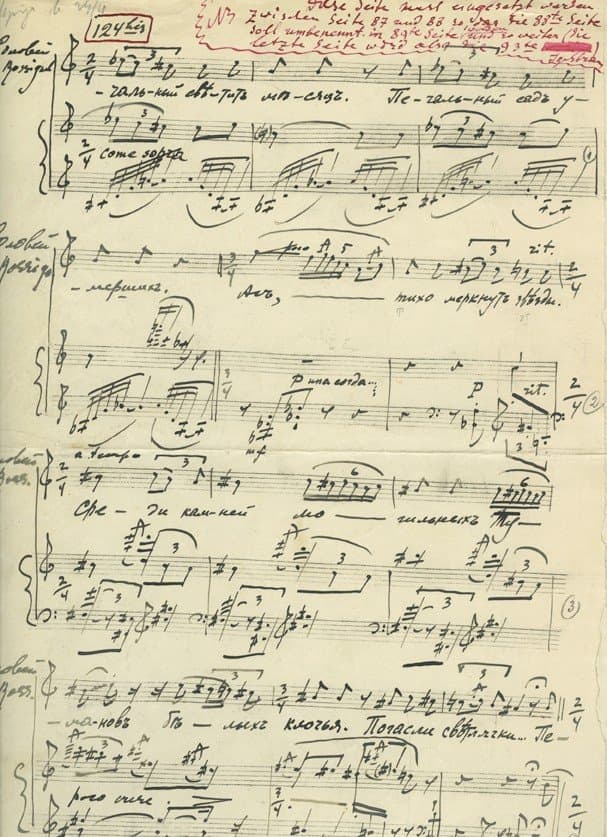
Stravinsky’s Le Rossignol (The Nightingale) music score
The music becomes an interaction between the pentatonic “Chinese” scale and the octatonic idiom of The Rite of Spring. The orchestration of the new scenes matched the brash harmonic idiom, exploiting striking colour contrasts in place of the rich and subtly blended sonorities of the first. Mind you, the Moscow Free Theatre folded before The Nightingale could be staged, and the première went to Diaghilev in Paris after all.
For more of the best in classical music, sign up for our E-Newsletter
